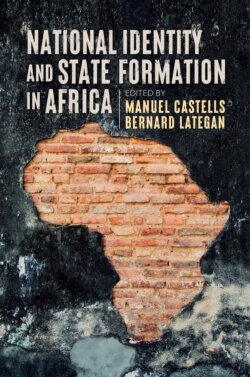National Identity and State Formation in Africa

Реклама. ООО «ЛитРес», ИНН: 7719571260.
Оглавление
Группа авторов. National Identity and State Formation in Africa
CONTENTS
Guide
List of Illustrations
Pages
National Identity and State Formation in Africa
Preface
Contributors
Abbreviations
Chapter 1 Introduction: Identity, Networks and State Formation in Africa
Chapter 2 Mobility, Globalization and the Policing of Citizenship and Belonging in the Twenty-first Century
Cecil John Rhodes as the epitome of unsettling mobility
A settler becomes a native
Rhodes as an exemplarymakwerekwere?
Magic and terror of Rhodes’s imperial power
Rhodes’s legacy asUitlanderandmakwerekwere
Is it time or even possible to put Rhodes to rest?
Rupture or conviviality?
Decolonization as the quest for conviviality
Conclusion
Chapter 3 Federalism in Africa
Introduction
Federalism in Africa: meaning, scope and significance
Federal solutions and uncompleted state-building processes
Territory, identity and divided societies
The character of the elite
Conclusion
Chapter 4 National Identity and State Formation: The Case of the Former UN Trust Territory of the British Southern Cameroons
Introduction
Identity as part of the human mosaic
Identity and the law
State formation and international law
Territory as both a criterion of statehood and an element of national identity
Population both as a criterion of statehood and as an element of national identity
Birth of new states through secession
Identity and the former UN trust territory of the Southern British Cameroons
Dominant colonial history as a former British territory
Territory with well-delimited international boundaries
International recognition and a qualified subject of international law
A people
Primary attributes as indigenous and ethnic communities
Conclusion
Chapter 5 The Secession of Eritrea from Ethiopia: A Historical Profile
Prologue
Layers of identity
The roots of Eritrean secessionism
From federation to independence
From independence to yet another round of war
Conclusion
Chapter 6 National Identity of Sudan and the Emergence of South Sudan
Introduction
Forging a separate identity for Southern Sudan through historical processes
Fusing two separate political entities with different identities into one
Issues of identity preceding the independence of the Sudan
Misguided policies of national identity at independence
Entrenching the cultural and political identity of Southern Sudan
Discourses on an alternative vision of national identity
Perceptions of national identity during and after the interim period
Concluding remarks
Chapter 7 A New Kind of State for the Nation? Civil Society Mobilization and White Minority Identity Politics in Post-apartheid South Africa
Introduction
The rise and fall of Afrikaner states
The Solidarity Movement
A new state for the nation
Conclusion
Chapter 8 Reimagining the Sporting Nation: Negotiating Identity and Globalization Amongst ‘Coloured’ Supporters of the New Zealand Rugby Team
Introduction
Enthusiasm and reactions
A potent past
Enduring symbolism and a quest for belonging
Politics of performance and intergenerational bonds
Wider considerations: commercialization and cyberspace
Conclusions
Chapter 9 The Persistence of Ethnic Identities in KwaZulu-Natal
Introduction
The resurgence of Zulu ethnic identities and their implications for nation-building
Retracing the history of Zulu identity since the rise of the Zulu kingdom
Changing political economy and mobilization of Zulu ethnic identities (1920–1994)
Conclusion
Chapter 10 Identity-based Conflict in KwaZulu-Natal: Current State and Future Prospects
Introduction
How colonialism shaped apartheid
From Union to apartheid
The Bantustan era: 1948–1994
Post-1994 identity politics: 1994–2008
The king, traditional leadership and the land
The ethnic revival
Using the issue of the Ingonyama Trust to fuel violence
Globalization and neocolonialism
In conclusion, future prospects of identity-based conflict
Chapter 11 Rethinking Mobility, States, Borders and Identity
Mobility
States
Borders
Identity
References
Index. A
B
C
D
E
F
G
H
I
J
K
L
M
N
O
P
Q
R
S
T
U
V
W
X
Y
Z
POLITY END USER LICENSE AGREEMENT
Отрывок из книги
Edited by Manuel Castells and Bernard Lategan
STIAS promotes high-level, innovative and interdisciplinary research (for more details, see https://www.stias.ac.za). For this project, a group of twelve experts were invited to explore the contradictory dynamics of globalization and identity and how this interaction is reshaping Africa in the twenty-first century. The result is a highly original book offering insights with historical, social, political, conceptual and methodological implications.
.....
Rhodes stands tall as an example to all amakwerekwere the world over, who are victims of the exclusionary violence of zero-sum games of belonging played by powerful states and those they co-opt in the name of bona fide nationhood and citizenship. Rhodes’s lesson to all those defined and confined as makwerekwere is clear: the only way to outgrow the status of makwerekwere within the logic of zero-sum games of ever-diminishing circles of inclusion is to rise and challenge – with violence and superior technology – the status of social, political, cultural and economic invisibility which others readily confer on their real or imagined ‘outsiders’, ‘foreigners’ or ‘Uitlanders’ and ‘strangers’.
The racialized hierarchies pioneered by Rhodes and perfected by apartheid are still very active in the purportedly new non-racist South Africa, where everyone is in principle equal in citizenship and before the law. However, few have the luxury of living their freedoms in abstraction. Ironically, black labourers remain confined to the margins, in townships or seething slums of hurriedly erected shacks, desperately seeking to get by. Many struggle on a daily basis despite the ‘enormous, untold, inconceivable wealth’ they have helped dig out of their native soils since the Kimberley days – to fill the insatiable imperial pockets of Rhodes and his band of Uitlanders or amakwerekwere from Europe.
.....